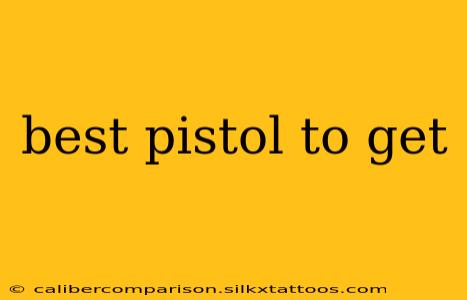Finding the "best" pistol is a deeply personal quest, much like finding the perfect pair of shoes. What's ideal for one person might be utterly unsuitable for another. This comprehensive guide will help you navigate the world of handguns, focusing on factors to consider to choose the pistol best suited for your individual needs.
Understanding Your Needs: The Foundation of Your Search
Before diving into specific models, honestly assess your needs. This crucial first step will drastically narrow down your options and prevent buyer's remorse.
1. Intended Use: A Defining Factor
- Self-Defense: This dictates a focus on reliability, ease of use, and concealability (if carrying concealed). Smaller, lighter pistols often excel here.
- Home Defense: Size and capacity become more important. Larger pistols with higher magazine capacities provide a tactical advantage in a home invasion scenario.
- Competition: This opens up a broader range, potentially including specialized competition-grade pistols with features designed for accuracy and speed.
- Target Shooting/Recreational Use: Accuracy and ergonomics are paramount, allowing you to enjoy the shooting experience without compromising on performance.
2. Experience Level: Beginner vs. Expert
- Beginners: Start with a pistol known for its ease of use, reliability, and manageable recoil. Avoid overly complex features until you've built a solid foundation.
- Experienced Shooters: More advanced features (like adjustable sights, custom grips, or specific trigger mechanisms) become viable options as skill develops.
3. Physical Considerations: Ergonomics and Fit
- Hand Size: A pistol that doesn't fit your hand comfortably will impact accuracy and control. Try out different models to find the best ergonomic fit.
- Strength: Recoil is a significant factor. If you have weaker hands, choose a pistol with lower recoil. Caliber choice plays a crucial role here.
Key Factors to Consider When Choosing a Pistol
Once you've assessed your needs and experience, consider these critical factors:
1. Caliber: Choosing the Right Cartridge
Caliber refers to the diameter of the bullet. Popular pistol calibers include:
- 9mm: A widely popular, versatile round offering a good balance of stopping power and manageable recoil. Extensive ammunition availability.
- .45 ACP: Known for its substantial stopping power, but with more significant recoil.
- .40 S&W: Falls somewhere between 9mm and .45 ACP in terms of power and recoil.
- .22 LR: Excellent for target shooting and training due to its low recoil and affordability, but less potent for self-defense.
The best caliber depends heavily on intended use and your physical capabilities.
2. Action Type: Understanding Mechanisms
- Semi-Automatic: The most common type, automatically cycles a round after firing.
- Revolver: Uses a cylinder to hold multiple rounds. Offers reliability but typically lower capacity.
3. Capacity: Magazine Size Matters
Magazine capacity varies significantly among pistols. Higher capacity offers more shots before reloading but can affect size and weight.
4. Reliability: A Non-Negotiable Factor
Reliability is paramount, especially for self-defense. Choose a pistol from a reputable manufacturer with a proven track record of dependability.
5. Safety Features: Prioritizing Safety
Many modern pistols incorporate features like manual safeties, decocker mechanisms, or grip safeties to prevent accidental discharge.
Beyond the Specs: Where to Begin Your Search
After considering all the above, visit your local gun store. Handling different models and receiving expert advice is invaluable. Don't hesitate to ask questions and try shooting different pistols at a range before making your final decision. Responsible gun ownership includes thorough research, training, and a commitment to safe handling practices.
This guide provides a starting point. Remember, responsible gun ownership starts with thorough research and understanding. Consult with experts, and always prioritize safety.

